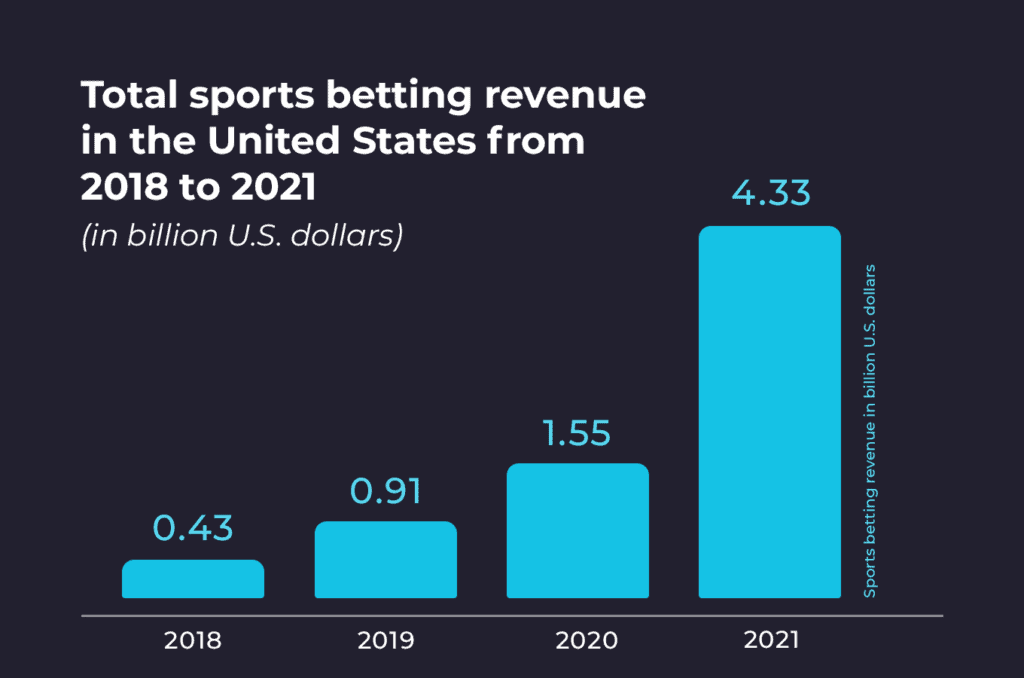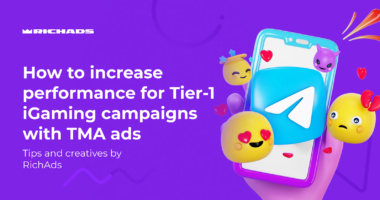Sports betting is a vertical with growing potential year by year. But on the other hand, there are some serious challenges lurking in the future that may limit the freedom advertisers have with promoting sports betting.
So – we strongly recommend taking advantage of this business opportunity while it lasts!
We explain the details and intricacies of advertising sports betting below and why we feel this is a unique time to jump into this vertical.
What is sports betting?
Although advertised as a game of skill, sports betting is a game of (mostly) chance where you place bets on the outcomes of games and matches that occur in the real world or are simulated in a virtual world. The latter phenomenon is called fantasy sports, where players create fictional teams consisting of real players and stack them against each other.
(There is a whole discussion on whether fantasy sport relies on skill or luck. For the purpose of this article, we will be treating all sport betting as a game where outcomes are highly uncertain).
The bets are placed on a special online platform designed to facilitate sport betting.
This is a big industry. In 2021, sport betting was worth over $50 billion in the US and is subject to exponential growth from 2018 through 2022 and most probably beyond.

Is sports betting the same as online gambling?
In a way, they are similar phenomena.
Many sport betting companies run sport betting alongside regular gambling (online poker, roulette and so on). But unlike online gambling (also called ‘igaming’), the outcomes are dependent on the result of someone else’s game.
There are several types of bets:
- Selecting a winner
- Assigning a number of points by which one team is favored over another
- Bets on several teams at once
This ties the whole industry to teams, leagues and championships in a real world that, until recently, had an ambivalent approach to sports betting.
For the majority of time, gambling on sports was often seen by sportsmen as something that spoils the pure spirit of sportsmanship.
But for the last couple of years, team owners, league operators, and other stakeholders have realized that this is a very lucrative pie that they are not getting any piece of. Plus, it is estimated that legal sports betting could increase the viewability of sport events.
The Sports Betting Landscape Overview
The legislation has become more and more favorable toward sports betting. The US supreme court lifted a federal ban on sport betting in 2018. This enabled states to allow sport betting advertising. The overall situation in the US is complex and each state should be considered separately when talking about sport betting legalization. But as of the moment of publishing this article, sport betting is fully legal in 13 states and legal in some form or with some limitations in the remaining majority.
On the other side of the pond, In Europe, the rules are more favorable towards sports betting.
But this as well may change soon.
The UK is already considering a ban that would not allow sport and TV stars to advertise sport betting.
There is also growing concern about the public health aspect of it. The overall messaging is that sports betting is a fun and risk-free leisure activity by which you can engage with a sport you love even more.
You’re probably starting to see why I was writing in such an urgent tone at the beginning of this article.
The critical time window
Sports betting companies focus heavily on attracting new people to the industry – and not only because of the money they leave. At this point, money is more of a by-product. The whole industry operates on rather low margins. Their primary incentive is getting data.
Learning who is more likely to stay and spend more money versus who will simply cash out their welcome bonus and leave is more important for them than short-term gains.
We are currently in the time period where sports betting is fairly legal but may soon be limited. The companies are trying to use this time and learn what they can before the costs of acquiring new customers will increase.
Targeting is everything

The traditional sport betting-oriented audience is:
- Masculine
- Middle-aged (38 years old on average)
- Employed
On one hand, such an audience looks like a sports betting model customer. These people have disposable income to spend and they like their hobbies.
However, there are two issues with that.
First, this is not sustainable. Without attracting more young people, the industry is doomed to fade away. And young people aren’t necessarily following their parents’ footsteps in choosing this form of entertainment. Plus, the disposable income may be a problem in a generation struggling with rising property prices and ballooning student debt.
Second, this description is very broad. In the world of contemporary digital marketing, a ‘38 year old man’ is not a precise enough description.
The key is in knowing who has more chances to stick around and spend more money on bets.
We are currently in the testing phase. Each bonus that a sport betting company uses to attract a prospective customer has a calculated risk that it will be consumed instead of becoming a foundation of a long-term relationship.
That’s not a problem.
Each person that grabs a bonus and pays out immediately will help these companies avoid people like this in the future.
They have to spend money to (hopefully) make money in the future.
How to gather data
The advantages of using digital marketing channels are obvious: you can precisely measure who saw your ad. This allows advertisers to reach cost optimization levels that are unobtainable for traditional outdoor advertising.
To learn the most from your traffic and viewers, you need to use digital marketing channels and an ad tracking solution.
An ad tracker or analytics platform is a specialized software that usually works in the cloud and is designed to record user-generated events. Once recorded, the data is then presented in the form of tables and graphs.
Voluum is an ad analytics software that has been designed exactly with the task of supporting marketers in their decision making processes.
It gathers 30+ data points on each click, is compliant with all ad platforms, including Google and Facebook, has vast automation features, and the longest track record of server uptime of all ad analytics solutions out there.
All these features, plus helpful and knowledgeable support, make it an indispensable companion for a sport betting marketer.
How to advertise sports betting

There is no one sure-fire way of advertising sports betting. According to this study, most advertising focuses on positive emotions: friendship, excitement, humor. The financial aspect of it, the possibility to earn money is not spoken outright. Yet it is subtextually understood that the money factor plays its role. Most people acknowledge that the things that convinced them to join a platform were free bonuses.
There are several marketing channels that can be used to advertise sports betting:
- Social. This channel allows marketers to reach a carefully outlined audience. However, social media platforms are generally not very welcoming of this vertical. Facebook for example, prohibits advertising sports betting unless it gives an advertiser written permission. Twitter is more relaxed with its series of exclusions from its general ban that vary from country to country. Always check an advertising platform’s policy before launching a campaign.
- Display. Ten years ago, banner ads were so prevalent on the internet that they almost became synonymous with online advertising. Today, banner blindness has blunted the effectiveness of these ads. But, they are cheap and still work with certain publishers.
- Video. This is the most persuasive ad format. It, however, requires some knowledge and budget to prepare an ad. Plus, if you want to advertise sport betting on YouTube (or other Google property), you must apply for a license, separately for each country. And only a handful of countries are allowed. But if you meet these requirements, you will have a convincing ad that works on visual, informative, and emotional levels.
- Push. If I had to highlight one single marketing channel that works best for advertising sports betting in the digital landscape, it would be push. Push notifications create a sense of urgency and are only displayed to a prequalified audience (so an audience that allowed for those notifications in the first place). This usually means higher conversion rates.
All these channels should be connected to an ad analytics solution and tested thoroughly.
Optimizing sports betting campaigns
- Track what you can. Most ad platforms allow you to pass some information about traffic to an ad tracker. This information includes a country or a publisher ID. This requires configuring tracking tokens, which may be a hassle for amateur advertisers. Voluum offers tons of templates with all tracking tokens already configured to make sure that you are not missing any important information.
- Test various options. Sometimes even the smallest differences in advertising may have the biggest effects on your profitability. Things like using a lighter or darker color palette, size or type of font, the quality and type of a photo used in your ad – all these things factor into your conversion rate as much as your offer’s actual value. A/B test different ad variations.
- Segment your traffic. Not every ad and angle works on everybody. Analyze data and catch patterns. Try showing different ad variations to different segments of traffic, such as people from cities vs people from the countryside, people using specific device types or using non-dominant languages. Make notes on your observations.
- Create whitelists and blacklists. They are the reflection of your experience. Whitelists contain placement names (concrete places where your ad is displayed) that are profitable, and blacklists contain placement names that are not profitable. Use these lists in your future campaigns.
Learn advertising sports betting while it is legal to learn
The legal landscape that, for now, allows sports betting may change in the future. One day you are running a perfectly nice sports betting campaign and the next day it is all banned due to health concerns.
Banning sports betting advertising is a quick and easy win for authorities that want to be viewed as efficient and concerned with public health issues.
To get started, secure some budget for testing, because being profitable shouldn’t be your immediate goal. At this point, your main goal is to learn and the best way to learn is by launching an actual campaign. Even if not profitable, this campaign will be the basis of a better one in the future.




